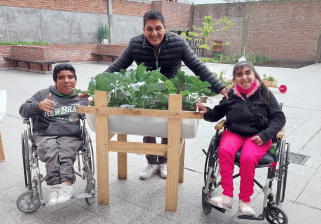
Aug
A path towards an inclusive and sustainable future
Special Education + Sustainability = A path towards an inclusive and sustainable future
Special education is designed to ensure the right to access education for every child, adolescent, and young person with temporary or permanent disabilities. Special education and sustainability can be integrated into teaching and learning processes, fostering a holistic, critical, and participatory perspective. By using active, collaborative, and playful methodologies that stimulate students’ reflective, creative, and ethical thinking, interdisciplinary and interinstitutional projects can be developed, such as waste management, agroecological gardens, or the revaluation of donated materials, aiming to engage students in solving real problems in their environment.
An example of an institution that integrates special education and sustainability into its core function is the Therapeutic Educational Center of Concepción (CETCO), which serves over 80 children with disabilities in Tucumán, Argentina. CETCO participates in the Sustainable Institutions Program carried out by Citromax. Thanks to the program, they were able to develop three core areas of work: Waste Management System, revaluation of donated materials, and Inclusive Agroecological Garden. These actions have a positive impact on the children, enabling them to develop motor, sensory, cognitive, and social skills; stimulate their creativity, self-esteem, and autonomy; create spaces for integration, cooperation, and coexistence; contribute to social and occupational inclusion, among other benefits.
The Waste Management System implemented at CETCO involves the separation, classification, reuse, and recycling of materials generated in the institution that are no longer in use, which are ultimately taken to the Ecological Point of Concepción (PEC).
This activity has multiple benefits for children with disabilities, allowing them to:
- Gain insights into the environmental repercussions of waste and strategies for its mitigation.
- Cultivate mindful and eco-conscious behaviors.
- Foster critical thinking, unleash creativity, and inspire innovation.
- Cultivate an arena for engagement, cooperation, and unity.
Material revaluation involves the donation of unused materials by Citromax to participating institutions in the program, with the aim of being repurposed and reused for educational or therapeutic purposes. This activity provides multiple benefits to the children of CETCO, such as:
- Exploring the potential of transforming and leveraging resources.
- Cultivating manual, artistic, and technical proficiencies.
- Igniting imagination, expression, and effective communication.
- Establishing an environment for enjoyment, amusement, and leisure.
This not only contributes to the social and occupational inclusion of the children but also provides them with tools and opportunities for their personal and professional development. They themselves designed the inclusive gardens used for cultivating seasonal vegetables, making them easily accessible to children with motor difficulties.
In the Inclusive Agroecological Garden project, compost is produced and seasonal vegetables are cultivated. This activity offers multiple benefits to the children, enabling them to:
- Acquire knowledge about life cycles, balanced nutrition, and environmental stewardship.
- Enhance motor, sensory, cognitive, and social proficiencies.
- Ignite creativity, boost self-esteem, and nurture independence.
- Establish an environment for integration, collaboration, and harmonious coexistence.
Furthermore, the inclusive agroecological garden contributes to the institution’s kitchen supplies by providing fresh and healthy vegetables for the children’s daily consumption.
The Sustainable Institutions Program is an initiative that demonstrates that sustainability is not just an environmental issue but also a social and economic one that can be facilitated through special education. The case of CETCO is an example of how work strategies can be adapted to create activities that promote learning, development, integration, and inclusion for children with different abilities.
These endeavors empower them not only to gain knowledge and competencies, but also to articulate their thoughts, communicate effectively, enjoy themselves, and experience a sense of belonging within a community. This serves as an open call to contribute towards shaping a just, balanced, and cyclical future for all generations, spanning the present and beyond.
Author: Milagro Peralta
Translation: Estefania Scuka
Date: August 8, 2023.
@CitromaxGroup


